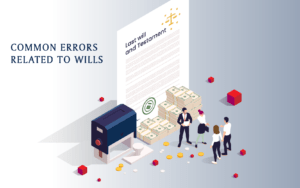
One of the most common mistakes people make when creating a Will is failing to keep it updated and relevant to their current circumstances. Here are a few common errors found in Wills that we have found:
- Not regularly updating the Will: Life circumstances change over time, such as marriages, divorces, births, deaths, acquiring new assets, or selling existing ones. Failing to update the Will accordingly can lead to unintended consequences and the distribution of assets in a manner inconsistent with the person’s wishes.
- Not considering all assets: Some individuals may overlook certain assets when creating their Wills, such as bank accounts, investments, real estate, or personal belongings. It is important to ensure that all significant assets are accounted for and addressed in the Will to avoid potential disputes or unintended consequences such as paying unnecessary Probate fees.
- Not specifying alternate beneficiaries: People often name primary beneficiaries in their Wills but fail to include alternative beneficiaries or contingent provisions. If the primary beneficiary predeceases the testator (the person making the Will), not having alternative beneficiaries can result in complications and potential disputes. Alternate beneficiaries will be important on all financial instruments like RRSPs, TFSAs, RESPs, and Insurance policies. Again, this impacts Probate fees and or the avoidance of them.
- Not appointing an Executor or Trustee: An Executor or Trustee is responsible for administering the Estate and ensuring that the wishes outlined in the Will are carried out. Failing to appoint a capable and trusted individual can lead to difficulties in Estate administration.
- Improperly executing the Will: Each jurisdiction has specific legal requirements for executing a valid Will. Failing to comply with these requirements, such as not having the Will properly witnessed or signed, can render the Will invalid or open it to challenges.
- Not having both Personal and Property Powers of Attorney prepared along with your Will. A Will is often read after death, putting important information about your wishes in the Power of Attorney documents can be critical in managing your Estate and personal wishes.
To avoid these common mistakes and ensure that your Will accurately reflects your intentions, it is recommended to consult with an experienced Estate planning lawyer who can guide you through the process and help you create a comprehensive and legally sound Will.
Check out our blog post about how many wills you can have
Latest Ontario Court Forms as of January 2022
Want more information?
Are you interested in a consultation with Peter R. Welsh?
Contact me at Peter@SmartWills.ca
By telephone 416-526-3121
Register for our blog to get valuable tips and up-to-date alerts.
This material is for general information and educational purposes only. Information is based on data gathered from what we believe are reliable sources. It is not guaranteed as to accuracy, does not purport to be complete and is not intended to be used as a primary basis for investment decisions.


